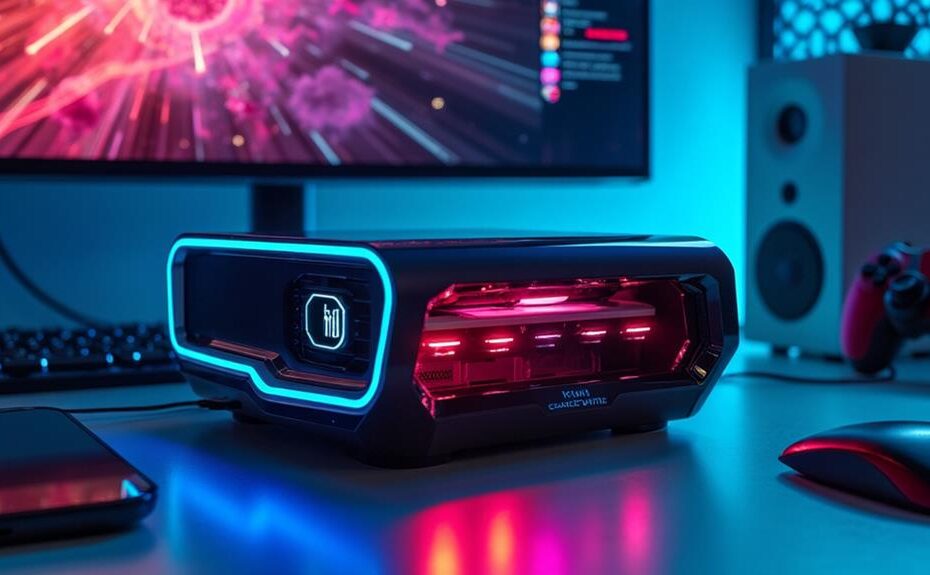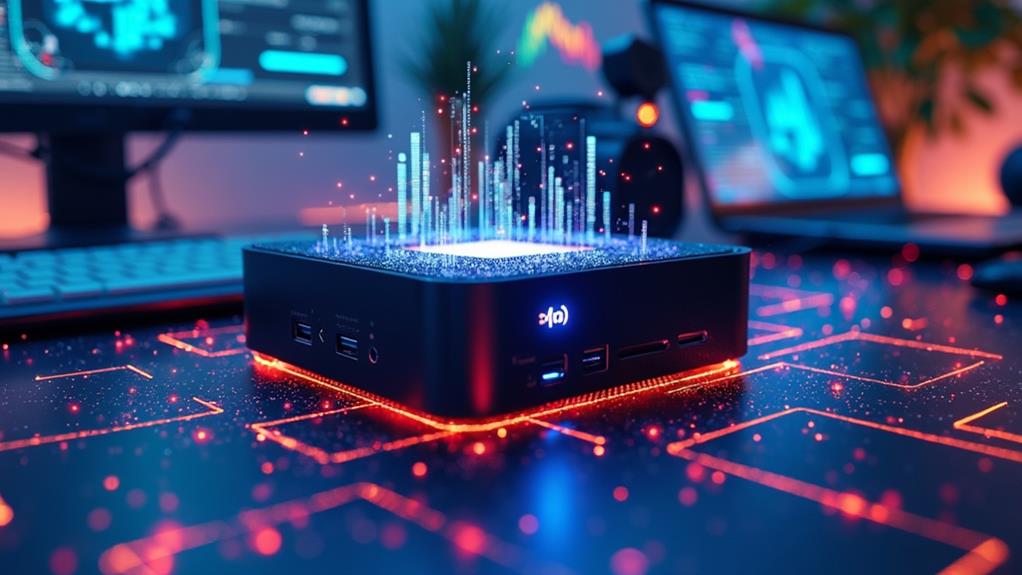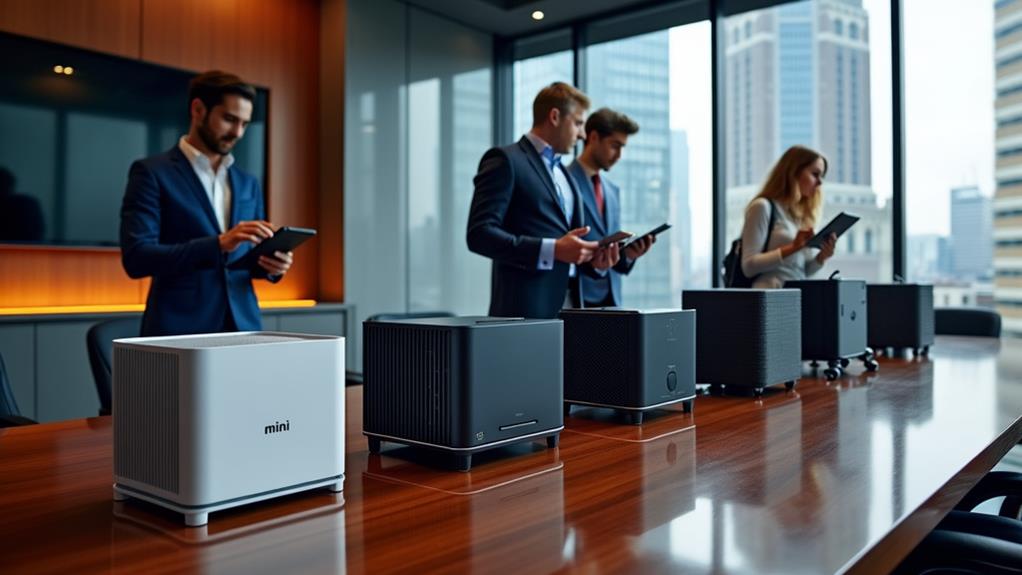



In 2023, mini PCs are evolving rapidly, with the market reaching approximately USD 22.7 billion and projected growth of over 5%. You'll notice a strong focus on energy efficiency and modular designs, allowing for easy upgrades and customization. AI integration enhances their functionality, making them suitable for gaming, data analysis, and remote work. Major players like Intel and Apple are launching powerful models with advanced processing capabilities, catering to diverse consumer needs. This evolution is also fueled by a growing community that encourages innovation and collaboration. Want to uncover more about what's driving this transformation?
Key Takeaways
- Mini PCs are increasingly adopting modular designs, allowing users to easily upgrade components like RAM and storage for enhanced customization.
- AI integration is becoming prominent, enabling mini PCs to perform complex tasks and real-time data processing, catering to advanced user needs.
- The market is witnessing significant product launches, such as Apple's Mac mini with M2 chips and Lenovo's ThinkCentre M70q Gen 3 with updated processors.
- The rise of IoT-enabled mini PCs is influencing consumer preferences, enhancing connectivity and making them suitable for smart home applications.
- Growing community engagement through forums and social media is driving innovation, encouraging collaboration and knowledge-sharing among mini PC users.
Mini PCs Market Overview
The mini PCs market reached a valuation of approximately USD 22.7 billion in 2023, and you can expect it to continue growing at a robust CAGR of over 5% from 2024 to 2032. This growth is largely driven by the increasing demand for compact computing solutions that offer energy-efficient performance. As remote work becomes more prevalent, mini PCs have emerged as portable and effective alternatives to traditional desktop computers, enhancing productivity without sacrificing space. Their robust features support remote monitoring applications, making them even more appealing in industrial and consumer settings alike. Technological advancements in processing power have played an essential role in this market expansion. You'll find that many mini PCs now support multitasking capabilities, making them ideal for both work and leisure. In 2023, the consumer electronics segment dominated the mini PCs market, accounting for over 40% of the total share, highlighting a strong interest among regular consumers.
Moreover, the Asia Pacific region is anticipated to lead in market growth, with a projected CAGR of 7% from 2024 to 2032. This surge is fueled by the rising demand for smart home automation and IoT-enabled devices, making mini PCs a key component of modern consumer electronics.
Current Trends in Mini PCs
As the mini PCs market continues to expand, current trends reveal a dynamic shift in user preferences and technological advancements. You'll notice that many mini PCs are becoming modular, allowing you to easily upgrade components like RAM, storage, and graphics to meet your specific needs. This flexibility enhances performance and user satisfaction, catering to a variety of applications. In this evolution, brands like ASUS and Intel NUC are leading the charge, innovating with powerful, compact designs that are ideal for demanding tasks.
AI integration is another significant trend, making mini PCs capable of performing complex operations that were once reserved for larger systems. This development positions these compact devices as suitable options for advanced tasks, particularly in fields like IoT and remote monitoring, where edge computing is gaining traction. Additionally, the mini PC community has flourished, with forums and social media groups providing platforms for enthusiasts to share knowledge and showcase innovative setups. Significantly, the recent shift in the industry, marked by Intel's exit from the NUC product line and ASUS's acquisition of the brand, guarantees continued innovation in small form factor computing solutions. Together, these trends illustrate a vibrant landscape for mini PCs, emphasizing their growing importance in modern computing.
Innovations Shaping Mini PCs
Innovations in mini PCs are redefining what's possible in compact computing, showcasing remarkable advancements that cater to a wide array of user needs. In 2023, you'll find mini PCs like Intel's NUC 13 Extreme and ASRock's Mini PC Jupiter 600, boasting enhanced processing capabilities that support multitasking and multiple displays. This high performance is complemented by integrated graphics, making them ideal for both work and play. With a focus on performance specifications and requirements, many models now feature high-speed processors and dedicated GPUs, ensuring smooth streaming and broadcasting performance.
AI technology has emerged as a game-changer, empowering mini PCs to handle complex operations and real-time processing, particularly in IoT applications and edge computing. The trend of modularity allows you to customize components such as RAM, storage, and graphics, tailoring your device to specific tasks or preferences, which enhances overall functionality.
As the mini PC community expands, knowledge-sharing and creative setups illustrate the versatility of these compact solutions across multiple applications. Notable product launches like Lenovo's ThinkCentre M70q Gen 3 and Dusun IoT's DSGW-290 smart home hub demonstrate the industry's commitment to developing more powerful, efficient mini PCs, ensuring they remain a relevant choice for diverse computing needs.
Market Segmentation Insights
Understanding the mini PC market requires a close look at its segmentation, which reveals the diverse needs and preferences of consumers. The consumer electronics segment currently dominates, capturing over 40% of the market share, as users increasingly seek compact computing solutions for everyday applications. This shift highlights the growing demand for devices that maintain high performance within a small footprint.
Delving deeper, the processor segment stands out, anticipated to grow at a CAGR of over 6.5% from 2024 to 2032. As technological advancements in miniaturization and performance continue, you'll find that energy consumption plays a vital role in influencing consumer choices. Additionally, the rise of IoT-enabled mini PCs has transformed market dynamics, with smart home automation and connectivity becoming key factors in consumer buying behavior.
The Asia Pacific region is poised for significant growth, projected at a 7% CAGR from 2024 to 2032, driven by both personal and business demands for these compact solutions. Overall, understanding these segmentation insights can help you navigate the evolving landscape of the mini PC market and make informed decisions based on your preferences and needs.
Competitive Landscape Analysis
The competitive landscape of the mini PC market is marked by fierce rivalry, with major players like Acer and Intel Corporation commanding over 10% of the market share in 2023. This competition is fueled by continuous innovation and a keen focus on addressing the needs of both businesses and consumers. For instance, Intel announced advancements in their processors that enhance performance, keeping pace with AMD Ryzen's growing influence.
ASUS's acquisition of Intel's NUC product line exemplifies strategic maneuvers in this small computing solutions segment, guaranteeing ongoing development and support for this popular option. Additionally, new entrants like Simply NUC are making waves, showcasing products such as Onyx and Everglades 2, which emphasize community-driven development and modularity.
The Asia Pacific region is expected to witness a 7% CAGR from 2024 to 2032, indicating a robust demand for compact computing solutions. As companies vie for market share, they are prioritizing enhanced efficiency and performance. This competitive landscape not only drives technological advancements but also guarantees that you, as a consumer, have access to a diverse range of mini PCs tailored to your needs at home and in the workplace.
Latest Product Launches
As competition heats up in the mini PC market, manufacturers are stepping up their game with a flurry of exciting product launches. For instance, ASRock's Mini PC Jupiter 600, launched in March 2023, features nine USB ports and multi-display support, making it ideal for users in home offices or media centers who need extensive connectivity.
In January 2023, Apple introduced the Mac mini, now equipped with M2 and M2 Pro chips, which greatly enhance performance, particularly for content creation and video conferencing. Lenovo followed suit in February 2024 with its ThinkCentre M70q Gen 3, powered by 13th Gen Intel Core processors, optimizing it for demanding business applications.
Moreover, in September 2023, Dusun IoT launched the DSGW-290, a smart home hub that reflects the growing trend of IoT integration within mini PCs. Intel also made waves with its NUC 13 Extreme, designed specifically for gaming and content creation, offering support for powerful graphics cards in a compact form factor. These launches showcase how manufacturers are prioritizing performance, connectivity, and versatility in their latest offerings, catering to diverse user needs.
Future Outlook for Mini PCs
With the mini PC market projected to grow at a CAGR of over 5% from 2024 to 2032, advancements in processing power and the demand for compact, energy-efficient computing solutions are driving innovation. You'll likely see more modular mini PCs, allowing you to customize components like RAM and storage to better fit your needs. This flexibility is essential in today's diverse computing landscape.
AI integration is becoming a game-changer, enabling mini PCs to manage complex operations and enhancing their applicability across various sectors, from gaming to data analysis. As the mini PC community continues to grow, collaboration and knowledge-sharing among users will foster even more innovation, enriching your overall user experience.
Furthermore, the shift toward remote work positions mini PCs as ideal solutions for IoT and edge computing applications. Their compact form factor combined with powerful performance allows for real-time processing capabilities, making them indispensable in modern work environments. As you navigate future computing needs, expect mini PCs to evolve further, merging power and efficiency while maintaining their appeal for both personal and professional use.
Disclosure: As an Amazon Associate, I earn from qualifying purchases.






